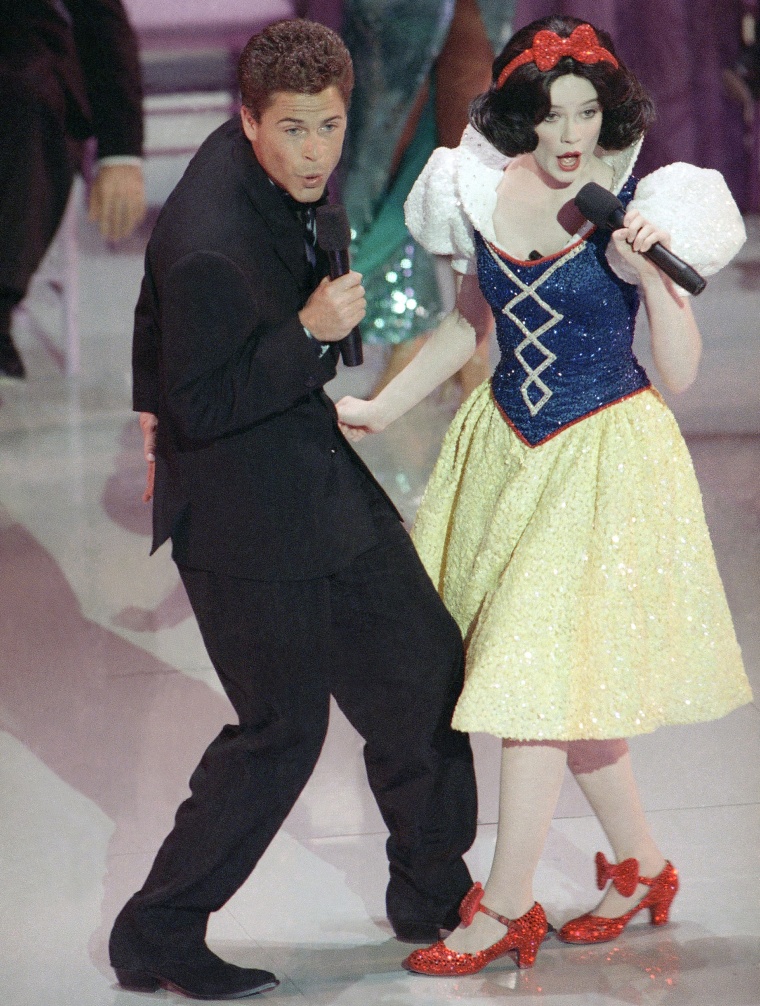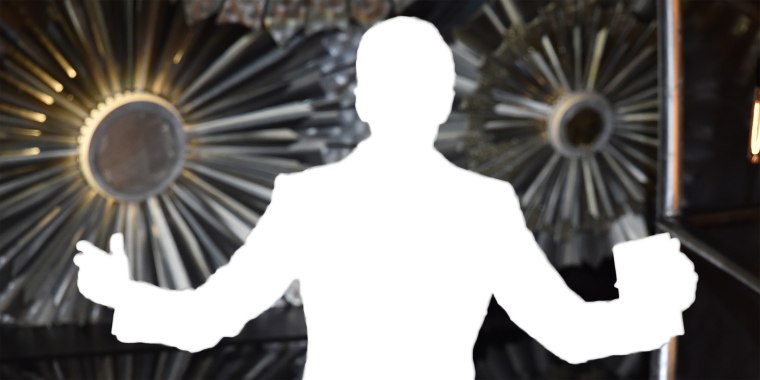The last time the Oscars didn't have a host, this happened:
The year was 1989. "Rain Man" won best picture. Dustin Hoffman scored his second best actor prize. "Who Framed Roger Rabbit" swept the technical categories. Lucille Ball made her final public appearance.
But the 61st Academy Awards, orchestrated by veteran producer Allan Carr ("Grease") and watched by more than 42 million Americans, is best remembered for the shamelessly over-the-top 11-minute musical number that opened the ceremony, displacing the standard host monologue.
Merv Griffin crooned a rendition of "I've Got a Lovely Bunch of Coconuts." A group of dancers cavorted around a nightclub set in cocktail-shaped headgear. Rob Lowe and Snow White, played by first-time actress Eileen Bowman, belted out a retooled version of "Proud Mary," with campy lyrics skewering the film industry.
The applause was tepid. The laughter was sparse. Tom Hanks, sitting in the crowd, looked uncomfortable. The press was not kind.
"The 61st Academy Awards ceremony began by creating the impression that there would never be a 62nd," the New York Times sneered. Hollywood's luminaries were just as dismayed. Julie Andrews, Paul Newman and 15 other stars sent a letter to the academy blasting the "demeaning" affair.
Thirty years later, Oscar producers are once again bracing for a ceremony without an emcee. The president of ABC, the network that airs the telecast, confirmed on Tuesday that the show would go on without a host after comedian Kevin Hart stepped aside in December amid furor over past homophobic tweets.
The stakes are high for Oscar co-producers Donna Gigliotti and Glenn Weiss, who hope to reverse a recent ratings slump. Three blockbusters up for best picture — "Black Panther," "Bohemian Rhapsody," and "A Star Is Born" — could help draw a bigger audience, and so could a tighter running time.

But without a megawatt star like two-time host Ellen DeGeneres — a headliner who can promote the Feb. 24 telecast, kick it off with a topical monologue and pepper the evening with well-timed zingers — the Oscars could be wobbly, according to Chris Beachum, managing editor of the awards site Gold Derby.
"If there's another envelope incident, for example," Beachum said, referring to the 2017 mix-up in which "La La Land" was incorrectly pronounced as best picture winner, "who will come to the stage with the perfect joke?" (Jimmy Kimmel was on hand that year, riffing that "La La Land" and the actual winner, "Moonlight," should just share the trophy.)
Karey Burke, the ABC entertainment president, projected confidence in front of reporters at a Television Critics Association event on Tuesday, insisting that the "mystery" and "lack of clarity around the Oscars has kept them in the conversation." She promised a "brisk" three-hour show.
"The producers decided to wisely not have a host and have the presenters and the movies be the stars," Burke said, according to reports. "From what I've heard, we have a very exciting opener planned," Burke added. "We are not going to go straight into people thanking their agents."
The academy on Monday announced the first slate of 13 stars who will help steer the show in the absence of an official host. The list includes Tina Fey, Whoopi Goldberg, "Captain Marvel" star Brie Larson, and "Crazy Rich Asians" breakouts Constance Wu and Awkwafina.
The small army of stars taking turns in the spotlight at the Dolby Theatre in Los Angeles could evoke years when the Oscars boasted as many as six co-hosts, according to film critic and historian Leonard Maltin.
In 1958, for instance, Hollywood eminences Bob Hope, David Niven, James Stewart, Jack Lemmon, Rosalind Russell and an animated rendering of Donald Duck shared top billing. In 1976, the co-hosts were Goldie Hawn, Gene Kelly, Walter Matthau, George Segal and "Jaws" scene-stealer Robert Shaw.
"That format seemed smooth-running in every way," Maltin said. (The last show with a rotating cast of hosts was in 1987, the year Hawn, Chevy Chase and Paul Hogan of "Crocodile Dundee" fame split the job.)
Maltin said he was "cautiously hopeful" that this year's Oscars could avoid the cringe-worthy lows of the 1989 edition. But he added that he understood why the memory of that 30-year-old musical number would make a host-free show seem like such a high-wire risk.
"Unfortunately, we can't shake the memory of that horrible, horrible night," Maltin said.

